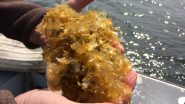CRC
1 February 2019
Aug 18-21: Conference on Fisheries and Coastal Environment in Accra, Ghana ...read more1 November 2018
Nov 8: CRC to host RIMTA’s Annual MeetingCRC will be hosting the RI Marine Trades Association’s annual ...read more25 October 2018
Nov 8 and Nov 9: Game of FloodsCRC is teaming up with Providence, RI Emergency Management Agency – ...read moreThis progress report details activities, results, and lessons learned during the first quarter of Project Year 5 (FY19). It also explains how partners contributed to the achievement of targets and how these achievements will be sustained to meet the overarching goal of SFMP.
read moreThere are funding challenges that are reflected in the Year 5 work plan. On July 10, 2018 SFMP submitted a pipeline request for funding of US$ 2,598,917. On August 23, 2018 USAID informed SFMP that a budget modification would be made to provide US$1,750,00 in additional funding with the possibility that no additional funding would be available until March 31, 2019.This work plan reflects programming of the entire amount currently obligated through March 31, 2019.The project will require an additional obligation in FY 19,prior to April 1, 2019 of US$1,592,550 to carry SFMP activities through closeout of the project by Oct 29, 2019.
read moreYear 4 of SFMP comes with notable changes in some specific activities and in the overall organization of work. Competency-based training for Ghana’s Marine Police is complete. Ongoing gender-based work will be mainstreamed into other work areas of the project. Year 4 work reflects a tighter focus on the formal adoption of outstanding policies and the acceptance and implementation of fisheries management measures by stakeholders in the fisheries sector. This includes a fisheries sector closed season for both trawlers and canoes (although canoes technically are exempted from seasonal closures in the current five-year national fisheries management plan), rollout of the national co-management policy, adoption of an additional fishing holiday (non-fishing day) in all coastal regions beyond the single traditional fishing holidays already established in each region, and broader implementation of the fisheries sector national gender policy. Multi-media and multi-modality efforts will increase awareness of the state of Ghana’s inshore small pelagic fisheries stocks, the problems at the root of the current near-collapse of small pelagics populations, and actions that need to be taken to address these problems.
read moreThis annual report updates project progress through Year 4 (October 1, 2017 to September 30, 2018) and provides information on how partners are contributing to the achievement of project targets and how these achievements will be sustained to meet the overarching goal of SFMP. Progress towards implementing significant management measures in the fisheries sector in Ghana were highlighted in dramatic fashion in Q4 of FY18 when a nationwide closed season was announced by MOFAD and rescinded shortly thereafter following a letter to the President from the Ghana National Canoe Fishermen’s Council (GNCFC).
read moreL’objectif du projet USAID/COMFISH Plus est d’appuyer les efforts du Gouvernement du Sénégal visant à réformer le secteur de la pêche et à augmenter la résilience des communautés de pêcheurs et leurs moyens d’existence. Cela passe par le renforcement des conditions préalables nécessaires à l’amélioration de la gouvernance des pêcheries, l’accès à la science pour appuyer les processus de prise de décision, l’identification et l’adoption de mesures contribuant à améliorer la résilience au changement climatique.
read moreThe objective of the USAID/Ghana Sustainable Fisheries Management Project (SFMP) is to rebuild marine fisheries stocks and catches through adoption of responsible fishing practices. This progress report hereby details activities, results, and lessons learned during the first quarter of Project Year 3 (FY17). It also explains how partners contributed to the achievement of set targets and how these achievements will be sustained to meet the overarching goal of SFMP.
read moreThe Fisheries sector plays a significant role in the Ghanaian economy overall. It directly employs 263,000 people and is estimated to contribute to the livelihoods of 2.6 million Ghanaians. Ghana’s fish trade deficit is growing. In 2013, it increased to US$319 million while fish imports grew to US$373 million. The small-scale artisanal (canoe) fishery is an important sector of Ghana’s economy and plays significant roles in supporting livelihoods and food security. This fishery produced 70% of the marine fish supply in 2015. Reducing the total fishing effort to the targets recommended by a science and technical working group15 would allow small-pelagic stocks to recover and rebuild. The potential maximum production by 2030 is 90,000MT. Improved post-harvest handling and processing can reverse current post-harvest losses in the value chain that range from 4% to 50% of salted, dried and smoked fish products in Africa. USAID’s significant investments are achieving results and contributing to its country strategy and Ghana’s fisheries and food security development agenda.
read moreTopic Mapping for Organizing Document Collections Online: An example of the population, health and environment (PHE) approach and the Knowledge for Health platform
read more Understanding Potential Markets for Farmed Kelp in New England
read more
Understanding Potential Markets for Farmed Kelp in New England
read more